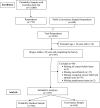Identifying Sociodemographic Disparities in Negative Cancer Beliefs and Health-Information-Seeking Attitudes Among Oregonians
- PMID: 40717418
- PMCID: PMC12304630
- DOI: 10.1177/10732748251361300
Identifying Sociodemographic Disparities in Negative Cancer Beliefs and Health-Information-Seeking Attitudes Among Oregonians
Abstract
BackgroundBeliefs and perceptions about cancer risks and accessibility of health information play an important role in influencing cancer screening behaviors and various health outcomes. However, these beliefs and attitudes are not well understood, especially across different racial and socioeconomic groups. The aim of this study was to identify sociodemographic factors associated with cancer risk perceptions and health-information-seeking attitudes among adults.MethodsThis study utilized data from the Understanding Cancer in Oregon (UCanOR) project, which administered a 47-item cross-sectional survey to capture sociodemographic and behavioral information. Participants were recruited through area-based random sampling and public convenience sampling across Oregon. Multivariable generalized linear and logistic regression analyses were used to evaluate attitudes towards cancer risk and accessing health information.ResultsThe study included a total of 1357 respondents [mean age of 50.0 (SD = 17.8)], primarily Non-Hispanic White (87.3%), followed by Asians/Pacific Islanders (8.4%), Hispanic White (3.5%), and Black (0.8%). Compared to Non-Hispanic Whites, Asians/Pacific Islanders were 2.5 times more likely to believe cancer is caused by behavior or lifestyle, 2.8 times more likely to agree that there is little one can do to prevent cancer, and 1.6 times more likely to associate cancer with death.ConclusionAsians/Pacific Islanders were more likely to agree with statements expressing frustration and distrust towards cancer beliefs and health information searches. Future community outreach efforts should consider tailoring the message to their target audiences. Understanding and addressing the underlying reasons for these negative perceptions is crucial for developing effective education and health promotion strategies.
Keywords: Oregon; cancer beliefs; cancer fatalism; health behaviors; health information search; survey.
Conflict of interest statement
Declaration of Conflicting InterestsThe authors declared no potential conflicts of interest with respect to the research, authorship, and/or publication of this article.
Similar articles
-
Behavioral interventions to reduce risk for sexual transmission of HIV among men who have sex with men.Cochrane Database Syst Rev. 2008 Jul 16;(3):CD001230. doi: 10.1002/14651858.CD001230.pub2. Cochrane Database Syst Rev. 2008. PMID: 18646068
-
A New Measure of Quantified Social Health Is Associated With Levels of Discomfort, Capability, and Mental and General Health Among Patients Seeking Musculoskeletal Specialty Care.Clin Orthop Relat Res. 2025 Apr 1;483(4):647-663. doi: 10.1097/CORR.0000000000003394. Epub 2025 Feb 5. Clin Orthop Relat Res. 2025. PMID: 39915110
-
Risk-stratified Care Improves Pain-related Knowledge and Reduces Psychological Distress for Low Back Pain: A Secondary Analysis of a Randomized Trial.Clin Orthop Relat Res. 2025 Apr 1;483(4):607-620. doi: 10.1097/CORR.0000000000003351. Epub 2025 Jan 21. Clin Orthop Relat Res. 2025. PMID: 39842027 Clinical Trial.
-
Sexual Harassment and Prevention Training.2024 Mar 29. In: StatPearls [Internet]. Treasure Island (FL): StatPearls Publishing; 2025 Jan–. 2024 Mar 29. In: StatPearls [Internet]. Treasure Island (FL): StatPearls Publishing; 2025 Jan–. PMID: 36508513 Free Books & Documents.
-
Parents' and informal caregivers' views and experiences of communication about routine childhood vaccination: a synthesis of qualitative evidence.Cochrane Database Syst Rev. 2017 Feb 7;2(2):CD011787. doi: 10.1002/14651858.CD011787.pub2. Cochrane Database Syst Rev. 2017. PMID: 28169420 Free PMC article.
References
-
- Centers for Disease C . Prevention. Cancer screening - United States, 2010. MMWR Morb Mortal Wkly Rep. 2012;61(3):41-45. - PubMed
MeSH terms
Grants and funding
LinkOut - more resources
Full Text Sources
Medical


